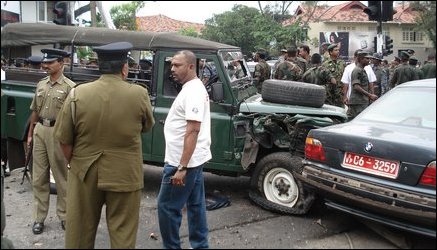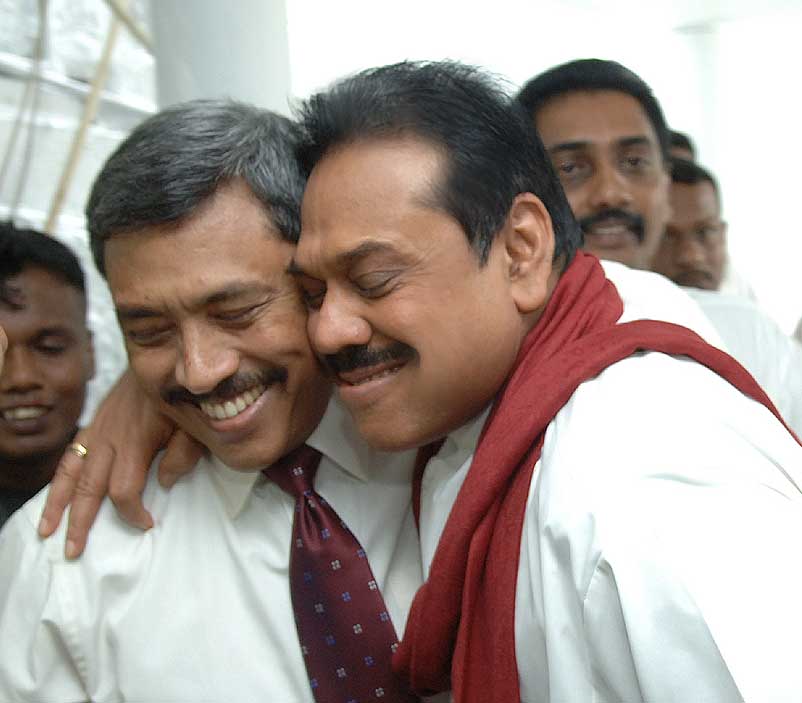A daring suicide bombing against Sri Lanka's top defence official has exposed gaping security gaps, stoking fears that the Tamil Tigers could resort to more spectacular strikes, officials and analysts say.
The driver of an auto-rickshaw breached the tightest security and detonated explosives packed into his three-wheel contraption Friday as defence secretary Gotabaya Rajapakse drove past in a heavily armed convoy in Colombo.
Police blamed the Liberation Tigers of Tamil Eelam (LTTE).
The attack was along a street where plain-clothed intelligence agents had been deployed to check for “suspicious activity.” It is also regularly patrolled by troops, a security official told AFP.
 |
| Def. Sec. Rajapakse's bulletproof BMW was damaged, but he was unhurt. Photo TamilNet. |
Two motorcycle outriders and the bomber were blown to pieces while 14 others were wounded in what the security official described as a well-planned operation.
“A big question is, if there was inside information, there will have to be a re-think of what has been done so far,” the official told AFP, declining to be named.
Friday's attack was the latest in a string of suicide bombings over the past few months.
In April, a woman pretending to be a soldier's pregnant wife infiltrated the army headquarters here in a suicide attack in which army chief Lt. Gen. Sarath Fonseka was seriously wounded.
Two months later, the army's number three officer was killed by a suicide bomber riding a motorcycle.
At least 116 people, mostly sailors, were killed while boarding buses when a suicide bomber exploded a truck full of explosives in October.
The government is worried that there may have been inside help to carry out some of the previous attacks.
An army officer is currently being held for allegedly providing information to the Tigers in connection with at least two attacks since April, officials said.
The latest target, the defence secretary - who is also President Mahinda Rajapakse's younger brother - is accorded protection reserved for a head of state. Hitting his convoy is a serious blow to the security authorities.
He travels in a convoy of several identical cars which have their windows tinted. He is also provided protection by army commandos riding open jeeps and motorcycles. Yet Friday's bomber managed to hit the right car.
The bullet-proof BMW limousine saved Rajapakse, who suffered only a minor gash above his right eyebrow, but it rocked the entire government.
“The government considers this suicide bomb attack by the LTTE as a serious challenge posed to the security, sovereignty and territorial integrity of the Sri Lankan state,” the cabinet of ministers said in a statement.
The Tigers are known for trademark suicide bombings. On Monday, they honoured 299 suicide bombers, or Black Tigers, who have died while carrying out audacious strikes since 1987 along with over 18,000 other fighters killed in three decades of civil war.
Assuming the Tigers carried out Friday's attack, their failure to hit their mark was unusual, AP reported, quoting analysts.
"The LTTE is known for its efficiency, (but) these days targets are very closely guarded," Retired Air Marshall Harry Goonetilleke told AP. "You can't get at these people very easily."
In April, escort personnel saved the Army Chief from the full force of the blast.
Similarly on Friday, Rajapakse's guards had been vigilant and shielded him from harm, military spokesman Brig. Prasad Samarasinghe said.
 |
| President Mahinda Rajapakse (r) hugs his brother, Gothabaya, after the Def. Sec's escape. Photo TamilNet |
But the Tigers boast of an efficient intelligence wing that they say can infiltrate the government at anytime to obtain the itineraries of would-be targets, AP reported.
Friday's bombing came despite thorough car-by-car checks carried out by police and security forces, causing motorists to languish in traffic for up to six hours.
“What the attack showed on Friday is that all the checking and posting guards at frequent intervals along main roads has not helped,” said freelance defence writer Namal Perera. “What is needed is better intelligence.”
“One could argue that the Tigers failed to get their target and it means they will try again, go for another target or adopt different tactics.”
Retired brigadier-general Vipul Boteju said the defence chief was lucky to have escaped, and believed the Tigers would try to carry out more strikes.
“If the explosion took place a little closer to the BMW, it would have been a different story,” Boteju told AFP.
"This (is) not at all a dilution of their (Tigers) capabilities. They are being unlucky," Iqbal Athas, a top defense journalist and analyst in Sri Lanka told AP after Friday's bombing.
"They are being hampered by the security preparations. Despite the failures they are not going to give up the modus operandi," he said.
